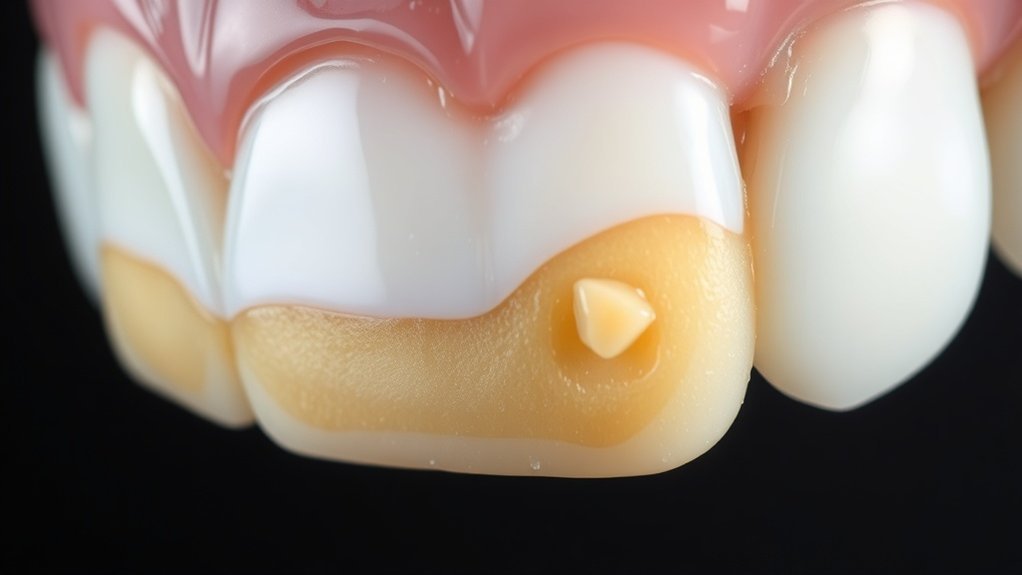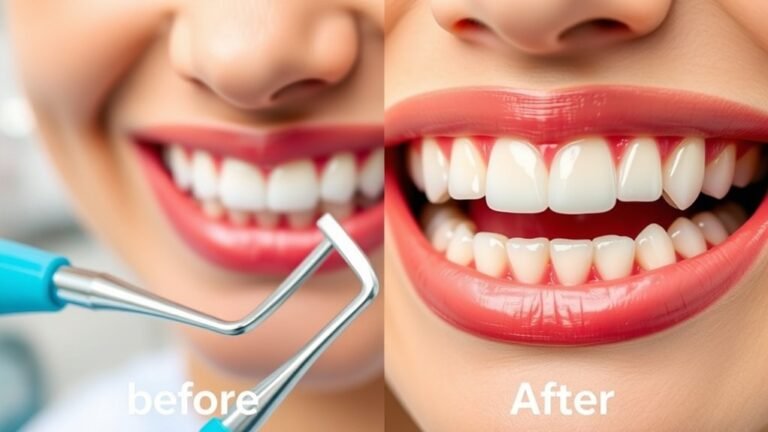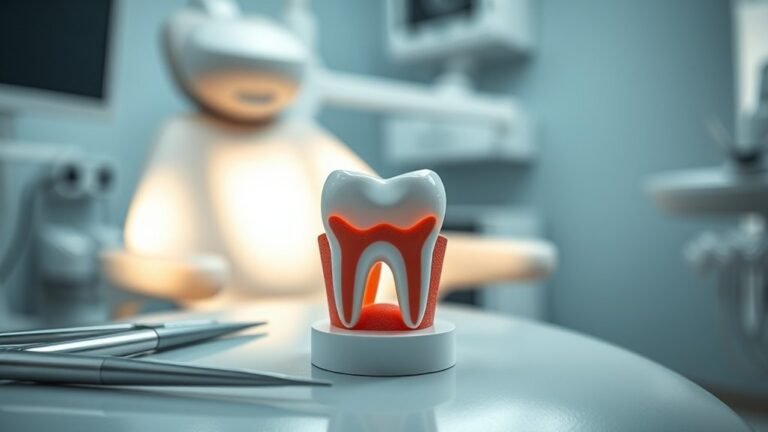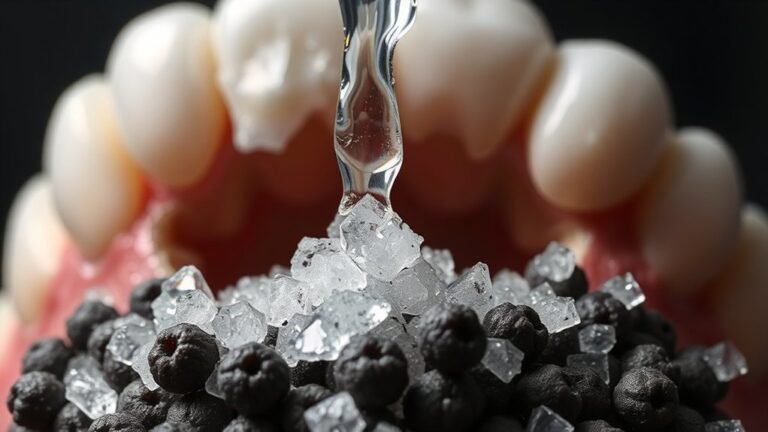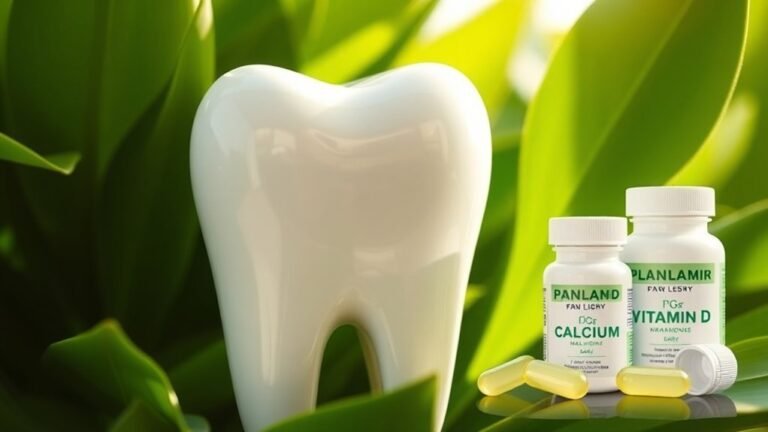How Quickly Does Plaque Turn Into Tartar if Untreated
Plaque can start to harden into tartar within just 24 to 72 hours if you don’t maintain proper oral hygiene. This change happens quickly, making it essential to brush and floss regularly. If left untreated, tartar can lead to several dental issues, including gum disease and tooth decay. By being proactive, you can effectively prevent tartar buildup. To learn more about managing plaque and tartar effectively, check out additional tips and insights.
Key Takeaways
- Plaque can start to harden into tartar within 24 to 72 hours if left untreated.
- Initial mineralization of plaque occurs approximately 1-2 days after formation.
- Tartar may become visibly rough within about one week of plaque accumulation.
- Without intervention, fully hardened tartar typically forms in two weeks or more.
- Effective plaque control can significantly slow down the rate of tartar formation.
What Is Plaque and How Does It Form?
Plaque is a sticky film of bacteria that forms on your teeth and gums. This plaque buildup occurs when oral bacteria mix with food particles and saliva. If you don’t brush and floss regularly, this film can grow thicker, leading to potential dental problems. The bacteria in plaque produce acids that can erode your tooth enamel and irritate your gums, causing inflammation and gum disease. It’s important to understand that plaque forms continuously throughout the day, especially after eating sugary or starchy foods. By maintaining a consistent oral hygiene routine, you can minimize plaque buildup and maintain healthy gums and teeth. Regular dental check-ups and cleanings also play an essential role in controlling oral bacteria and preventing complications.
The Process of Plaque Hardening Into Tartar
As you neglect regular brushing and flossing, the soft plaque on your teeth can begin to harden into tartar. This process occurs due to the mineralization of plaque, primarily from saliva. The longer you wait to control plaque, the faster tartar forms on your teeth.
| Stage | Description | Duration |
|---|---|---|
| Plaque Formation | Soft, sticky biofilm on teeth | 24 hours |
| Initial Hardening | Minerals start to harden plaque | 1-2 days |
| Advanced Tartar | Tartar becomes visible and rough | 1 week |
| Full Tartar Formation | Fully hardened, requires professional cleaning | 2 weeks and beyond |
Implementing effective plaque control can slow tartar formation speed, protecting your oral health.
Timeline: How Quickly Does This Transition Occur?
Understanding the timeline of how quickly plaque hardens into tartar can help you take proactive steps in your oral hygiene routine. Typically, plaque deposits begin to mineralize within 24 to 72 hours of forming. If left untreated, these deposits can turn into tartar buildup in as little as a week. This change occurs because the minerals in your saliva interact with the plaque, causing it to harden. Once tartar forms, it becomes much more challenging to remove, often requiring professional dental cleaning. To prevent this progression, you should maintain a consistent oral hygiene routine that includes brushing twice daily and flossing regularly. By doing so, you can effectively manage plaque and reduce the risk of tartar formation.
Factors Influencing the Speed of Plaque to Tartar Conversion
Several factors can influence how quickly plaque converts to tartar, and being aware of them can help you maintain better oral health. The speed of this conversion can depend on your oral hygiene habits, diet, and saliva production.
| Factor | Influence on Conversion | Recommendations |
|---|---|---|
| Oral Hygiene | Poor hygiene accelerates plaque buildup. | Regular brushing and flossing. |
| Diet | Sugary and acidic foods promote plaque. | Limit sugary snacks and drinks. |
| Saliva Production | Saliva helps neutralize acids and wash away plaque. | Stay hydrated to support saliva flow. |
The Role of Oral Hygiene in Preventing Tartar Buildup
Maintaining good oral hygiene is essential in preventing the formation of tartar, which can lead to more serious dental issues. By following effective oral care routines, you can notably reduce the accumulation of dental plaque. Brushing twice a day with fluoride toothpaste helps remove plaque from tooth surfaces, while flossing daily targets areas between teeth that brushes often miss. Additionally, using an antibacterial mouthwash can further enhance dental plaque removal, ensuring your mouth stays clean. Regular dental check-ups are vital, as professional cleanings can eliminate any stubborn plaque before it hardens into tartar. By prioritizing these practices, you’ll not only protect your teeth and gums but also maintain your overall oral health.
Signs That Plaque Has Turned Into Tartar
As plaque hardens and turns into tartar, you’ll notice several distinct signs indicating this progression. One of the first signs is a change in color; the once-soft, white bacterial plaque may turn yellow or brown. You might also feel a rough texture on your teeth, particularly along the gum line, where tartar tends to accumulate. Bad breath can become more persistent, as tartar harbors bacteria that contribute to halitosis. Additionally, you may experience increased gum sensitivity or bleeding during brushing or flossing. If you notice these symptoms, it’s essential to consult a dental professional. Ignoring these signs can lead to more serious oral health issues down the line. Regular check-ups can help you stay ahead of tartar buildup.
Health Risks Associated With Untreated Tartar
Untreated tartar can lead to serious health issues, including gum disease, which can cause painful inflammation and tooth loss. It also increases your risk of tooth decay and contributes to persistent bad breath. Addressing tartar buildup promptly is essential for maintaining your oral health.
Gum Disease Development
When plaque hardens into tartar, it creates a breeding ground for harmful bacteria that can lead to gum disease. Neglecting tartar buildup can greatly impact your gum health. As bacteria proliferate, they trigger gum inflammation, which may start as mild irritation but can progress to more severe conditions like gingivitis or periodontitis. Symptoms often include redness, swelling, and bleeding of the gums. If left untreated, gum disease can cause not only discomfort but also tooth loss and systemic health issues. To protect your gum health, it’s essential to maintain good oral hygiene and seek professional dental cleanings regularly. By doing so, you can minimize the risk of gum inflammation and the long-term consequences associated with untreated tartar.
Tooth Decay Risks
Neglecting to address tartar buildup can considerably increase your risk of developing tooth decay. When tartar forms, it creates a rough surface that traps food particles and bacteria, leading to cavities. The longer you wait to remove tartar, the higher your cavity risk becomes. Here’s a quick look at the potential outcomes of untreated tartar:
| Condition | Impact on Oral Health | Cavity Risk |
|---|---|---|
| Early Cavities | Minor decay | Low |
| Moderate Decay | Requires fillings | Moderate |
| Severe Decay | Possible root canals | High |
| Gum Disease | Tooth loss potential | Very High |
| Overall Health Effects | Systemic issues possible | Elevated |
Taking action against tartar is vital for maintaining your dental health and minimizing tooth decay.
Bad Breath Issues
Tartar buildup not only heightens the risk of tooth decay but can also lead to bad breath, a condition that many people find embarrassing. When tartar forms, it creates a rough surface for bacteria to thrive, which can contribute to persistent bad breath issues. These bacteria can cause gum infections, leading to inflammation and further complications in your oral health. If you ignore tartar, you might find yourself facing not just unpleasant odors but also potential gum disease. Maintaining good oral hygiene is essential to prevent tartar accumulation. Regular brushing, flossing, and dental check-ups can help you keep your breath fresh and your gums healthy, reducing the risk of gum infections and the embarrassment of bad breath.
Tips for Effective Plaque Control and Prevention
To effectively control and prevent plaque buildup, daily brushing is essential. It helps remove food particles and bacteria before they can harden into tartar. Regular dental checkups also play an important role in maintaining your oral health and catching issues early.
Daily Brushing Importance
When you brush your teeth daily, you’re actively fighting plaque buildup, which is essential for maintaining oral health. Regular brushing removes food particles and plaque before they can harden into tartar, a more serious dental issue. Aim to brush at least twice a day, using fluoride toothpaste to strengthen your enamel. Don’t forget to replace your toothbrush every three to four months to guarantee effective cleaning. Focus on a two-minute brushing routine, covering all surfaces—front, back, and chewing areas. Incorporating proper brushing techniques, like using gentle circular motions, enhances your dental hygiene efforts. Remember, consistent brushing not only keeps your teeth clean but also supports your overall health by preventing gum disease and cavities.
Regular Dental Checkups
While daily brushing is essential, regular dental checkups play an important role in effective plaque control and prevention. These visits allow your dentist to identify plaque buildup before it hardens into tartar, which can lead to more serious oral health issues. During your checkup, the dentist or hygienist not only cleans your teeth but also assesses your overall oral health, providing tailored advice on the best oral health products for your needs. They can recommend effective tools like electric toothbrushes or special mouth rinses that enhance your daily routine. By scheduling regular dental checkups, you guarantee that you’re taking proactive steps to maintain your oral health and keep plaque at bay. Don’t underestimate the value of these appointments!
Frequently Asked Questions
Can Tartar Form Without the Presence of Plaque?
No, tartar can’t form without plaque. Plaque, a sticky film of bacteria, must accumulate on teeth first. If you don’t remove plaque through brushing and flossing, it hardens into tartar over time.
Is Tartar Removal Painful or Uncomfortable?
Tartar removal isn’t usually painful, but you might feel some discomfort during the procedure. Your dentist will use tools to clean your teeth, which can create sensations, but they’ll make certain you’re comfortable throughout.
How Often Should Dental Cleanings Occur to Prevent Tartar?
You shouldn’t worry about discomfort; dental cleanings should occur every six months. Regular visits help prevent tartar buildup, ensuring your teeth stay healthy and your smile remains bright. Consistency is key to effective oral care.
Can Diet Influence Plaque and Tartar Formation?
Yes, your diet can considerably influence plaque and tartar formation. Consuming sugary and acidic foods promotes plaque buildup, while a balanced diet rich in fiber and nutrients can help maintain oral health and reduce tartar risk.
What Are the Best Products for Plaque Control?
To control plaque effectively, use fluoride toothpaste, an antibacterial mouthwash, and dental floss. Consider electric toothbrushes for better plaque removal. Regular dental check-ups also help maintain ideal oral hygiene and prevent plaque buildup.
Conclusion
In summary, plaque can turn into tartar in as little as 24 to 72 hours if left untreated. You might think brushing occasionally is enough, but regular oral hygiene is essential to prevent this hardening process. Ignoring plaque buildup can lead to more severe dental issues, including gum disease. By maintaining a consistent oral care routine, you can effectively control plaque and safeguard your oral health. Don’t underestimate the importance of daily brushing and flossing!
